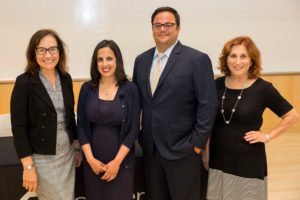
Welcoming Dr. Rana Awdish (second from left) to CMSRU, are (from left) Annette C. Reboli, MD, Dean of CMSRU; Anthony J. Mazzarelli, MD, JD, MBE, Co-President/CEO of Cooper University Health Care; and Susan Bass Levin, President and CEO of The Cooper Foundation.
Rana Awdish, MD, author of In Shock, discussed her best-selling memoir based on her first-hand account of going from a young critical care physician to a dying patient in an instant. She was the featured speaker for the Seventh Annual Berkowitz Family Foundation Lecture Program.
Awdish is Director of the Pulmonary Hypertension Program at Henry Ford Hospital in Detroit, Medical Director of Care Experience at Henry Ford Health System, and Assistant Professor at Wayne State University School of Medicine. She completed her medical degree at Wayne State University and her residency at Mount Sinai Beth Israel in New York City. She returned to Detroit for her fellowship training at Henry Ford Hospital.
“As a critical care doctor treating people at their sickest, there is often an unspoken rule – keep your distance or you will burn out,” states Awdish. “However, this is a fundamental flaw in the medical profession. It is entirely possible to feel someone’s pain, acknowledge their suffering, hold it in our hands and support them with our presence without depleting ourselves, without clouding our judgment.”
Awdish’s book, and her message of empathy, communication, and connection, has been integrated into the curriculum of medical schools and universities across the U.S. and Europe. She was awarded the Speak-Up Hero award in 2014 for her work establishing a workshop-based program called CLEAR (Connect, Listen, Empathize, Align, Respect), which trains faculty and trainees in relationship-based communication skills. She was named Henry Ford Hospital’s Critical Care Teacher of the Year in 2016 and Physician of the Year by Press Ganey in 2017.
Rachel Haroz, MD, and Emily K. Damuth, MD, Emergency Medicine Physicians at Cooper University Health Care and Assistant Professors of Emergency Medicine at Cooper Medical School of Rowan University, served as Physician Champions for this year’s lecture. Both doctors were deeply impacted by Awdish’s book.
“The health care community has been given a gift of Awdish’s book and can benefit greatly from her insight,” stated Haroz. “For me, Dr. Awdish narrowed the distance between myself and my critical patients and has changed the way I practice for good.”
“Awdish’s message to us as caregivers is unmistakable and practice-changing,” added Damuth, who is also an Assistant Professor of Medicine. “We must connect with our patients for their sake and ours.”
The Berkowitz Family Foundation Lecture Program is presented by The Cooper Foundation, Cooper University Health Care, and Cooper Medical School of Rowan University, and funded by The Berkowitz Family Foundation.
“The Berkowitz Family Foundation Lecture Program is a valuable resource for our medical students, as well as our faculty,” said Annette C. Reboli, MD, Dean of Cooper Medical School of Rowan University. “Dr. Awdish’s message that ‘medicine cannot heal in a vacuum; it requires connection’ is something that all who work in health care should embrace.”
A successful businessman and philanthropic leader in the Delaware Valley, Edwin Berkowitz passed away in January 2016 from cancer. He was the Chairman of the Board of JE Berkowitz, LP Architectural Glass, founded by his father in 1920.
As a patient, Berkowitz observed the importance of ethical behavior and empathy by health care professionals. He was passionate when discussing the role of medical ethics in everyday care and the ethical considerations in the development of unique treatments and medical technology. He also had an interest in new “personalized medicine” cancer treatment programs that identify genetic changes within the tumor itself.
“My father cared deeply about humanism in medicine,” said Arthur Berkowitz on behalf of The Berkowitz Family Foundation. “He would be thrilled to know that Awdish’s book is creating a dialogue in the medical field and that physicians are embracing the importance of the human connection.”
